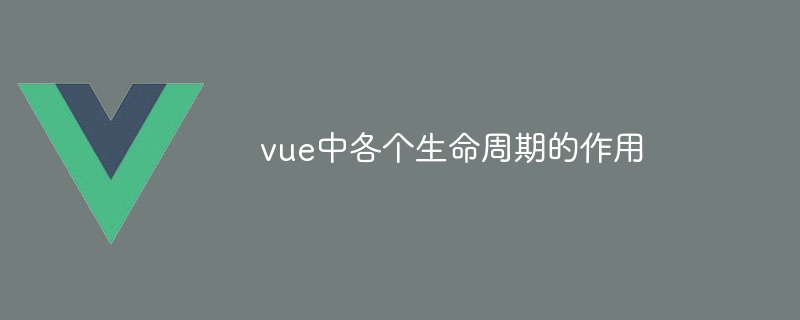Home >Web Front-end >Vue.js >The role of each life cycle in vue
The role of each life cycle in vue
- 下次还敢Original
- 2024-05-09 18:36:19574browse
Vue provides life cycle hooks to perform tasks during the component life cycle. These hooks are triggered in order, including: beforeCreate: triggered before the component is instantiated. created: Triggered after the component instance is created. beforeMount: Triggered before the component is mounted to the DOM. mounted: Triggered after the component is mounted to the DOM. beforeUpdate: Triggered before component props or data change. updated: Triggered after the component is updated. beforeDestroy: Triggered before the component is destroyed. destroyed: Triggered after the component is destroyed.

Vue life cycle
Vue.js provides a life cycle hook system for use in component life Perform specific tasks during the cycle. These hooks help you manage component state, perform side effects, and respond to user interactions.
Vue life cycle phases
Vue’s life cycle includes the following phases:
- ##beforeCreate: Create component instance triggered before.
- created: The component instance has been created but has not been mounted.
- beforeMount: Triggered before the component has been mounted to the DOM.
- mounted: The component has been successfully mounted to the DOM.
- beforeUpdate: Triggered before the component’s props or data change.
- updated: The component has been updated.
- beforeDestroy: Triggered before the component is destroyed.
- destroyed: The component has been destroyed.
The role of life cycle hooks
Each life cycle hook has a specific role:beforeCreate :
- Set default data and properties.
- Registration method.
created:
- Initiates an HTTP request to obtain data.
- Subscribe to events.
beforeMount:
- Manipulate DOM elements (for example, add event listeners).
- Delay the operation until the component is mounted.
mounted: The
- component has been mounted to the DOM and can be interacted with by the user.
- Access DOM elements.
beforeUpdate:
- Response to property or data changes.
- Update internal status.
updated:
- Operations on updated DOM elements.
- Trigger other operations.
beforeDestroy:
- Cancel the HTTP request.
- Unsubscribe from events.
- Clean up memory usage.
destroyed:
- Destroy the component instance.
- Release all resources.
The above is the detailed content of The role of each life cycle in vue. For more information, please follow other related articles on the PHP Chinese website!

